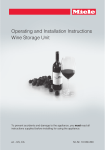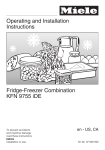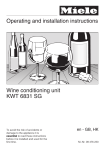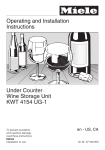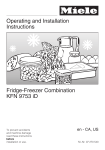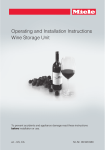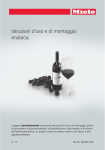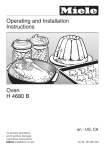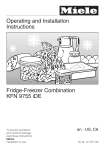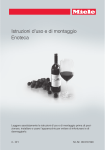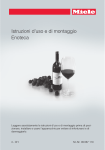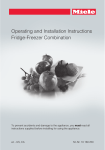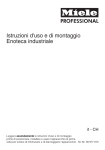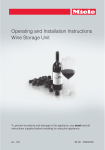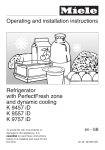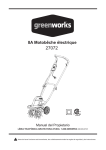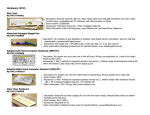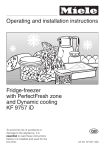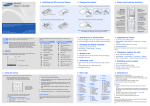Download Miele KWT 6322 UG Operating and Installation Instructions
Transcript
Operating and Installation Instructions Wine Storage Unit To prevent accidents and damage to the appliance, you must read all instructions supplied before installing for using the appliance. en - US M.-Nr. 10 036 280 Contents IMPORTANT SAFETY INSTRUCTIONS. . . . . . . . . . . . . . . . . . . . . . . . . . . . . . . . . 4 Guide to the appliance . . . . . . . . . . . . . . . . . . . . . . . . . . . . . . . . . . . . . . . . . . . . . 9 Accessories . . . . . . . . . . . . . . . . . . . . . . . . . . . . . . . . . . . . . . . . . . . . . . . . . . . . . 12 Emergency door opener . . . . . . . . . . . . . . . . . . . . . . . . . . . . . . . . . . . . . . . . . . . 13 Opening the door . . . . . . . . . . . . . . . . . . . . . . . . . . . . . . . . . . . . . . . . . . . . . . . 13 Closing the door . . . . . . . . . . . . . . . . . . . . . . . . . . . . . . . . . . . . . . . . . . . . . . . . 13 How to save energy . . . . . . . . . . . . . . . . . . . . . . . . . . . . . . . . . . . . . . . . . . . . . . . 14 Turning the appliance on and off . . . . . . . . . . . . . . . . . . . . . . . . . . . . . . . . . . . . 15 Before first use . . . . . . . . . . . . . . . . . . . . . . . . . . . . . . . . . . . . . . . . . . . . . . . . . . . . 15 Operating the appliance . . . . . . . . . . . . . . . . . . . . . . . . . . . . . . . . . . . . . . . . . . . . 15 Turning the appliance on . . . . . . . . . . . . . . . . . . . . . . . . . . . . . . . . . . . . . . . . . . . . 15 Turning the appliance off . . . . . . . . . . . . . . . . . . . . . . . . . . . . . . . . . . . . . . . . . . . . 16 Turning off for longer periods of time . . . . . . . . . . . . . . . . . . . . . . . . . . . . . . . . . . 16 Selecting additional settings . . . . . . . . . . . . . . . . . . . . . . . . . . . . . . . . . . . . . . . 17 Safety lock 0 . . . . . . . . . . . . . . . . . . . . . . . . . . . . . . . . . . . . . . . . . . . . . . . . . . . . . 17 Acoustic signals ) . . . . . . . . . . . . . . . . . . . . . . . . . . . . . . . . . . . . . . . . . . . . . . . . 18 Display brightness s. . . . . . . . . . . . . . . . . . . . . . . . . . . . . . . . . . . . . . . . . . . . . . . 19 Temperature and air quality . . . . . . . . . . . . . . . . . . . . . . . . . . . . . . . . . . . . . . . . 20 Temperature . . . . . . . . . . . . . . . . . . . . . . . . . . . . . . . . . . . . . . . . . . . . . . . . . . . . . 20 Setting the temperature . . . . . . . . . . . . . . . . . . . . . . . . . . . . . . . . . . . . . . . . . . 21 Possible setting values for the temperature . . . . . . . . . . . . . . . . . . . . . . . . . . . 22 Temperature display . . . . . . . . . . . . . . . . . . . . . . . . . . . . . . . . . . . . . . . . . . . . . . . 22 Air quality and humidity . . . . . . . . . . . . . . . . . . . . . . . . . . . . . . . . . . . . . . . . . . . . . 23 DynaCool (constant humidity) m . . . . . . . . . . . . . . . . . . . . . . . . . . . . . . . . . . 23 Air filtering with the active charcoal filter . . . . . . . . . . . . . . . . . . . . . . . . . . . . . 24 Temperature and door alarm . . . . . . . . . . . . . . . . . . . . . . . . . . . . . . . . . . . . . . . 25 Feature lighting . . . . . . . . . . . . . . . . . . . . . . . . . . . . . . . . . . . . . . . . . . . . . . . . . . 27 Turning the feature lighting on and off. . . . . . . . . . . . . . . . . . . . . . . . . . . . . . . . . . 27 Setting the brightness of the feature lighting . . . . . . . . . . . . . . . . . . . . . . . . . . 27 Lighting duration of the feature lighting . . . . . . . . . . . . . . . . . . . . . . . . . . . . . . 28 Storing wine bottles. . . . . . . . . . . . . . . . . . . . . . . . . . . . . . . . . . . . . . . . . . . . . . . 29 Wooden shelves . . . . . . . . . . . . . . . . . . . . . . . . . . . . . . . . . . . . . . . . . . . . . . . . . . 29 Moving the wooden shelves . . . . . . . . . . . . . . . . . . . . . . . . . . . . . . . . . . . . . . . 30 Adjusting the wooden shelves . . . . . . . . . . . . . . . . . . . . . . . . . . . . . . . . . . . . . 31 Labeling wooden shelves . . . . . . . . . . . . . . . . . . . . . . . . . . . . . . . . . . . . . . . . . 31 Decorative shelf . . . . . . . . . . . . . . . . . . . . . . . . . . . . . . . . . . . . . . . . . . . . . . . . 32 Contents Maximum capacity. . . . . . . . . . . . . . . . . . . . . . . . . . . . . . . . . . . . . . . . . . . . . . . . . 32 Automatic defrosting . . . . . . . . . . . . . . . . . . . . . . . . . . . . . . . . . . . . . . . . . . . . . . 33 Cleaning and care . . . . . . . . . . . . . . . . . . . . . . . . . . . . . . . . . . . . . . . . . . . . . . . . 34 Interior, appliance door and accessories . . . . . . . . . . . . . . . . . . . . . . . . . . . . . . . 35 Ventilation slits . . . . . . . . . . . . . . . . . . . . . . . . . . . . . . . . . . . . . . . . . . . . . . . . . . . . 36 Door seal . . . . . . . . . . . . . . . . . . . . . . . . . . . . . . . . . . . . . . . . . . . . . . . . . . . . . . . . 36 Air filter . . . . . . . . . . . . . . . . . . . . . . . . . . . . . . . . . . . . . . . . . . . . . . . . . . . . . . . . . . 36 Active charcoal filter . . . . . . . . . . . . . . . . . . . . . . . . . . . . . . . . . . . . . . . . . . . . . . 37 Changing the active charcoal filter . . . . . . . . . . . . . . . . . . . . . . . . . . . . . . . . . . . . 37 Frequently asked questions . . . . . . . . . . . . . . . . . . . . . . . . . . . . . . . . . . . . . . . . 39 Noises . . . . . . . . . . . . . . . . . . . . . . . . . . . . . . . . . . . . . . . . . . . . . . . . . . . . . . . . . . 44 After sales service . . . . . . . . . . . . . . . . . . . . . . . . . . . . . . . . . . . . . . . . . . . . . . . . 45 Warranty . . . . . . . . . . . . . . . . . . . . . . . . . . . . . . . . . . . . . . . . . . . . . . . . . . . . . . 45 Information for dealers . . . . . . . . . . . . . . . . . . . . . . . . . . . . . . . . . . . . . . . . . . . . 46 Demo mode r. . . . . . . . . . . . . . . . . . . . . . . . . . . . . . . . . . . . . . . . . . . . . . . . . . . . . 46 Caring for the environment . . . . . . . . . . . . . . . . . . . . . . . . . . . . . . . . . . . . . . . . . 50 Electrical connection . . . . . . . . . . . . . . . . . . . . . . . . . . . . . . . . . . . . . . . . . . . . . . 51 Installation . . . . . . . . . . . . . . . . . . . . . . . . . . . . . . . . . . . . . . . . . . . . . . . . . . . . . . 53 Side-by-side installation. . . . . . . . . . . . . . . . . . . . . . . . . . . . . . . . . . . . . . . . . . . . . 53 Location . . . . . . . . . . . . . . . . . . . . . . . . . . . . . . . . . . . . . . . . . . . . . . . . . . . . . . . . . 53 Climate class . . . . . . . . . . . . . . . . . . . . . . . . . . . . . . . . . . . . . . . . . . . . . . . . . . 54 Ventilation . . . . . . . . . . . . . . . . . . . . . . . . . . . . . . . . . . . . . . . . . . . . . . . . . . . . . . . 54 Before installation . . . . . . . . . . . . . . . . . . . . . . . . . . . . . . . . . . . . . . . . . . . . . . . . . 55 Door opening angle limiter . . . . . . . . . . . . . . . . . . . . . . . . . . . . . . . . . . . . . . . . . . 55 Installation dimensions . . . . . . . . . . . . . . . . . . . . . . . . . . . . . . . . . . . . . . . . . . . . . 56 Adjusting the door hinge . . . . . . . . . . . . . . . . . . . . . . . . . . . . . . . . . . . . . . . . . . 58 Under-counter installation . . . . . . . . . . . . . . . . . . . . . . . . . . . . . . . . . . . . . . . . . 62 Preparing the appliance . . . . . . . . . . . . . . . . . . . . . . . . . . . . . . . . . . . . . . . . . . . . 62 Aligning the appliance to taller furniture doors . . . . . . . . . . . . . . . . . . . . . . . . . . . 65 Pushing the appliance into the niche . . . . . . . . . . . . . . . . . . . . . . . . . . . . . . . . . . 66 Securing the appliance in the niche . . . . . . . . . . . . . . . . . . . . . . . . . . . . . . . . . . . 67 Adjusting the lateral alignment of the appliance door . . . . . . . . . . . . . . . . . . . 68 Contact details . . . . . . . . . . . . . . . . . . . . . . . . . . . . . . . . . . . . . . . . . . . . . . . . . . 71 IMPORTANT SAFETY INSTRUCTIONS Correct use When using the appliance, follow basic safety precautions, including the following: ~ This appliance is intended for use in Read all instructions before installation and use to prevent accidents and machine damage. ~ This appliance is intended for only ,This appliance conforms to current safety requirements. Inappropriate use can, however, lead to personal injury and damage to property. To avoid the risk of accidents and damage to the appliance, please read these instructions carefully before using it for the first time. They contain important notes on installation, safety, use and maintenance. Miele cannot be held liable for non-compliance with these instructions. Keep these instructions in a safe place and pass them on to any future owner. ,Danger of injury! At altitudes above 4921 ft. (1500 m) there is a risk of the glass door shattering! Shards of glass can cause injury! 4 domestic households and similar working and residential environments. It is not intended for outdoor use. for storing wine. Any other usage is not supported by the manufacturer and could be dangerous. The manufacturer cannot be held liable for damage resulting from incorrect or improper use or operation. ~ This appliance is not suitable for storing and keeping cool medicines, blood plasma, laboratory preparations or other such materials or products. Incorrect use of the appliance for such purposes can cause deterioration of the items stored. The appliance is not suitable for use in areas where there is a risk of explosion. Miele cannot be held liable for damage resulting from improper or incorrect use of the appliance. ~ The appliance can only be used by people with reduced physical, sensory or mental capabilities, or lack of experience and knowledge, if they are supervised while using it, or have been shown how to use it in a safe way and recognize and understand the consequences of incorrect operation. IMPORTANT SAFETY INSTRUCTIONS Safety with children Technical safety ~ Children should be supervised in the vicinity of the appliance. ~ The coolant system is tested for ~ Children ages eight and up may only use the appliance oven without supervision if they have been shown how to use it in a safe manner, and if they are able to recognize and understand the potential risks of improper use. ~ This appliance contains the coolant ~ Children must not clean or service the appliance unless they are under supervision. ~ Children should be supervised when they are near the appliance. This appliance is not a toy! To avoid the risk of injury, do not allow children to play with it or to use the controls. They will not understand the potential dangers posed by it. They should be supervised whenever you are working in the kitchen. ~ Ensure that any packing material is disposed of safely and kept out of the reach of children. Danger of suffocation! leaks. isobutane (R600a), a natural gas which is environmentally friendly. Although it is flammable, it does not damage the ozone layer and does not increase the greenhouse effect. The use of this coolant has, however, led to a slight increase in the noise level of the appliance. In addition to the noise of the compressor, you might be able to hear the coolant flowing around the system. This is unavoidable, and does not have any adverse effect on the performance of the appliance. Care must be taken during the transportation and setting up of the appliance that no parts of the cooling system are damaged. Leaking refrigerant can damage the eyes. In the event of any damage: – avoid open flames and anything that creates a spark, – disconnect the appliance from the electrical power supply, – air the room in which the appliance is located for several minutes and – contact Miele Technical Service. 5 IMPORTANT SAFETY INSTRUCTIONS ~ The more coolant there is in an appliance, the larger the room it should be installed in. In the event of a leakage, if the appliance is in a small room, there is the danger of combustible gases building up. For every 8 g of coolant at least 1 m3 of room space is required. The amount of coolant in the appliance is stated on the data plate inside the appliance. ~ To avoid the risk of damage to the appliance, make sure that the connection data (fuse rating, frequency and voltage) on the data plate corresponds to the household supply. Check that this is the case before connecting the appliance. Consult a qualified electrician if in any doubt. ~ Be certain your appliance is properly installed and grounded by a qualified technician. To guarantee the electrical safety of this appliance, continuity must exist between the appliance and an effective grounding system. It is imperative that this basic safety requirement be met. If there is any doubt, have the electrical system of the house checked by a qualified electrician. ~ If the power cord is damaged, it must be replaced by a Miele authorized technician in order to protect the user from harm. ~ Do not connect the appliance to the electrical supply with a power bar or extension cord. These are a fire hazard and do not guarantee the required safety of the appliance. 6 ~ Do not use the appliance in areas where there may be moisture or splashing water (e.g. garages, laundry rooms, etc.). Moisture can reach the electrical components and cause a short circuit. ~ This appliance is not to be used in non-stationary locations, such as ships. ~ Do not use a damaged appliance. It could be dangerous. Check the appliance for visible signs of damage. ~ To ensure safe operation, use the appliance only when it is installed. ~ The appliance must be isolated from the electricity supply during installation, maintenance and repair work. – the respective fuse has been removed, – the circuit breaker has been tripped,or – the power cord has been unplugged. Pull on the plug and not on the cord when removing it from the outlet. ~ Repairs should only be carried out by a qualified and trained person in strict accordance with local and national safety regulations. Unauthorized repairs could cause personal injury or machine damage and may void the warranty. ~ Repairs and other work performed by unauthorized persons could be dangerous and may void the warranty. IMPORTANT SAFETY INSTRUCTIONS ~ Defective components should only be replaced by Miele original parts. Only with these parts can the manufacturer guarantee the safety of the appliance. Proper use ~ The appliance is designed for use within a certain climate range (ambient temperatures), and should not be used outside this range. The climate range for your appliance is stated on the data plate inside the appliance. Installing it in a room with too low an ambient temperature, e.g. a garage, will lead to the appliance turning off for longer periods so that it cannot maintain the required temperature. ~ Do not cover or block the air vents. This can impair the efficiency of the appliance, increase the electricity consumption and cause damage to the appliance. ~ WARNING! Danger of damage from overheating. May restirct operation. Keep ventilation openings, in the appliance enclosure or in the built-in structure, clear of obstruction. ~ If you store fatty or greasy foods in the appliance or the appliance door, make sure that no oil or grease leaks onto the plastic parts of the appliance. This can cause the plastic to crack and break. ~ Do not store explosive materials in ~ Do not operate any electrical equipment (e.g. an electric ice cream maker) inside the appliance. Danger of sparking and explosion! ~ Use only genuine original Miele parts. If parts or accessories from other manufacturers are used, the warranty may become invalid. Cleaning and care ~ Do not use any oil or grease on the door seals. They can cause the seals to deteriorate over time. ~ WARNING! Risk of injury and damage. Do not use mechanical devices or other means to accelerate the defrosting process, other than those recommended by the manufacturer. ~ Never use a steam cleaner to clean the appliance. The steam can reach the electrical components and cause a short circuit. ~ Never use a pointed or sharp-edged object to – remove frost or ice, – separate frozen foods or remove ice trays. This will damage the evaporators, causing damage to the appliance. ~ Do not place electric heaters or candles in the appliance to defrost it. These can damage the plastic parts. the appliance or any products containing propellants (e.g. spray cans). Electrical components could cause flammable vapors to ignite. Danger of fire and explosion. 7 IMPORTANT SAFETY INSTRUCTIONS ~ Do not use defrosting sprays or de-icers, as they could contain substances which could damage the plastic parts or which might cause the build-up of gases and pose a danger to health. Transport ~ Ensure during and after disposal that the appliance isn't stored in the vicinity of gasoline or other flammable vapors and liquids. ~ When disposing of the appliance, ensure that the refrigeration circuit is not damaged to prevent uncontrolled escape of the refrigerant it contains (data on type plate) and oil. ~ Always transport the appliance in an upright position and in its original transport packaging to avoid damage in transit. ~ Take care not to damage any part of ~ The appliance is very heavy and – puncturing the coolant channels in the evaporator, must be transported by two people. Danger of injury and damage! the cooling system, for example by – kinking any pipework, – scratching the surface coating. Disposal of your old appliance ~ There is a risk of suffocation. Children playing can shut themselves in and suffocate. – Take the door(s) off. – Remove the drawers. – Leave the storage shelves in the appliance so that children cannot easily climb into the appliance. ~ Danger of electric shock. – Cut off the plug from the power cord and discard. – Cut off the power cord from the discarded appliance. Dispose of separately from the appliance. 8 Caution: Spraying coolant can damage the eyes. SAVE THESE INSTRUCTIONS AND PASS THEM ON TO ANY FUTURE USER Guide to the appliance a For turning the entire appliance on and off. b Optical interface (for Service use only) c Selection of the upper or lower wine conditioning zone d Activation/deactivation of the DynaCool function (constant humidity) e Activation/deactivation of the feature lighting f X To set a colder temperature g For confirming a selection (OK button) h Y To set a warmer temperature i For accessing or leaving settings mode j For turning the temperature and door alarms off k Display with temperature and symbols (symbols only visible in settings mode; see table for explanation of symbols) 9 Guide to the appliance Symbols in settings mode: Symbol Meaning Function 0 Safety lock Prevention of the inadvertent turning off or changing of settings ) Acoustic Signals Activation/Deactivation of the button tone and the door alarm if it has been activated r Demo mode (only visible when Demo mode is active) For turning off Demo mode s Display brightness For adjusting the brightness of the display Active charcoal filter Lights up when the active charcoal filter needs changing t Power supply Confirms that the appliance is connected (only visible when to the electrical supply; flashes in the appliance is turned off or case of a power failure in case of a power failure) ; Alarm (only visible when the temperature or door alarm is sounding) 10 Indicates a door or temperature alarm Guide to the appliance a Push2Open door catch b Lighting strip (in both wine conditioning zones) c Active charcoal filter d Control panel for the upper and lower wine conditioning zones / insulation plate for thermal separation of the zones e Isolator strips for thermal separation of the zones f Wooden shelves with labels (FlexiFrames with Noteboard) g Decorative shelf h Safety glass door with UV filter i Ventilation grill with air filter 11 Accessories Included accessories Active charcoal filter The active charcoal filter achieves optimum air quality by filtering the incoming air. Air filter The air filter behind the ventilation grill protects the cooling system from dust. Chalk Use the chalk to annotate the magnetic strips on the wooden shelves to identify your wines quickly and easily. Optional accessories Active charcoal filter (See "Included accessories" for a description.) Air filter (See "Included accessories" for a description.) Chalk (See "Included accessories" for a description.) 12 Stainless steel maintenance – Each application of the Miele stainless steel conditioner forms a water and dirt repellent protective coating. It gently removes water marks, fingerprints and other dirt for a uniformly shiny surface. – The stainless steel cleaning cloth is soaked with the stainless steel conditioner. It has the same cleaning and protective characteristics as the stainless steel conditioner. Optional accessories are available from Miele, your Miele dealer or online via the Miele website. Emergency door opener Emergency door opener The Push2Open door catch on your wine storage unit makes it easy to open the door. The appliance door is sensitive to pressure. To avoid damage to the emergency door opener: - Do not obstruct the appliance door while it is opening. - Do not push in or hold onto the door catch while the door is closing. Opening the door ^ Press briefly against the appliance door and then release it. The appliance door opens automatically by a gap. ^ Open the door fully, e.g. to take out a bottle of wine. To protect against inadvertent opening: if you do not open the door wider, it will close again by itself after approx. 3 seconds. Closing the door ^ Push the door shut. 13 How to save energy Installation / Maintenance Normal energy consumption Increased energy consumption In a well-ventilated room. In an enclosed, poorly ventilated room. Protected from direct sunlight. In direct sunlight. Away from heat sources (radiator, range/oven). Near a heat source (radiator, range/oven). Where the room temperature Where the room temperature is ideal, i.e. around 68°F is higher. (20°C). Do not block the ventilation openings, and keep them free of dust. Where the ventilation openings are blocked and full of dust. Remove and clean the air filter with a vacuum cleaner at least once a year. If dust has accumulated on the air filter. Temperature setting 50°F to 54°F (10°C to 12°C) The lower the temperature in the appliance, the higher the energy consumption. Use Wooden shelves arranged as they were when the appliance was delivered. Only open the door when necessary and for as short a time as possible. Store wine bottles in an organized way. Do not overfill the appliance in order to allow the air to circulate. 14 Frequent opening of the door for long periods will cause a loss of coldness. The appliance works harder to cool down and the compressor runs for longer periods. Turning the appliance on and off Before first use Operating the appliance Packaging material The appliance is operated with the use of touch keys activated by a finger. ^ Remove all packaging material from the inside of the appliance. Protective film Stainless steel surfaces have a layer of protective foil to prevent scratching during transportation. ^ Do not remove the foil until the appliance has been positioned in its final location. Start at one of the top corners. A tone will sound each time a button is touched. You can deactivate this, if you wish (see "Selecting additional settings - Acoustic signals"). Turning the appliance on The power supply symbol t will appear in the display as soon as the appliance has been turned on at the main power supply. Cleaning and care It is essential to follow the relevant instructions in "Cleaning and care." ^ Clean the inside of the appliance and the accessories with lukewarm water and a little washing-up liquid, and then dry with a soft cloth. ^ Touch the On/Off button. The power supply symbol t will then go out and the appliance will start to cool. The sensor buttons for the upper and lower wine conditioning zones will then appear in the control panel. The selected zone will be highlighted yellow and the temperature of the selected zone will show in the display. The first time the appliance is turned on, the sensor buttons for the wine conditioning zones and the alarm symbol ; will flash until the selected temperature has been reached in the zones. 15 Turning the appliance on and off As soon as the set temperature has been reached, the sensor button for the respective wine conditioning zone will light up constantly. The alarm symbol ; will go out as soon as the set temperatures have been reached in each zone. The interior lighting will come on when the door is opened. A different setting can be set for each conditioning zone. ^ Tap the sensor button for the wine conditioning zone for which you want to adjust the settings. The selected sensor button is highlighted in yellow. You can now: – Set the temperature – Turn on the DynaCool function Please refer to the relevant section in the manual for more information. If you then select the other wine conditioning zone, the settings for the previously selected zone will remain unchanged. Turning the appliance off ^ Touch the On/Off button. If this does not work, the safety lock 0 is activated. The sensor buttons for the two wine conditioning zones will then go out. The temperature display will go out and the power supply symbol t will appear. The interior lighting goes out and the cooling is turned off. Turning off for longer periods of time If the appliance is not going to be used for a longer period of time: ^ turn off the appliance, ^ unplug the appliance or trip the circuit breaker, ^ clean the appliance, ^ leave the door slightly ajar to air the appliance. If, during a long absence, the appliance is turned off but not cleaned out and the door is left shut, there is a danger of bacteria and odors building up inside the appliance. 16 Selecting additional settings Certain appliance settings can only be selected in the settings mode. The door alarm is automatically disabled when the appliance is in settings mode. Safety lock 0 The safety lock can be activated to prevent: – the appliance being turned off by mistake, – the temperature being changed by mistake, – DynaCool being turned on by mistake, – the feature lighting being turned on by mistake. ^ By tapping the X or Y button, you can now select whether the safety lock is activated or deactivated: 0: the safety lock is deactivated 1: the safety lock is activated. ^ Touch the OK button to confirm your selection. The selected setting will be adopted and the 0 symbol will flash. Activating and deactivating the safety lock ^ Touch the settings button. All symbols available for selection will appear in the display and the 0 symbol flashes. ^ Touch the settings button to leave the settings mode. Otherwise the appliance will exit the settings mode automatically after approximately one minute. The 0 symbol will appear in the display when the lock is activated. ^ Touch the OK button to confirm your selection. The last selected setting flashes in the display and the 0 lights up. 17 Selecting additional settings Acoustic signals ) The appliance features acoustic signals such as a keypad tone and acoustic alarm for the door and temperature alarm. You can turn the button tone or the door alarm acoustic alarm on or off, but you cannot deactivate the temperature alarm. There are four settings to choose from. Option 3 is set the factory, i.e. the button tone and the door alarm are turned on. ^ By touching the X or Y button you can now select: 0: button tone off; door alarm off 1: button tone off; door alarm on (after 4 minutes) 2: button tone off; door alarm on (after 2 minutes) 3: button tone on; door alarm on (after 2 minutes) Turning acoustic signals On/Off ^ Touch the OK button to confirm your selection. ^ Touch the settings button. The selected setting will be adopted and the ) symbol will flash. All symbols available for selection will appear in the display and the 0 symbol flashes. ^ Touch the buttons for setting the temperature (X or Y) repeatedly until the ) symbol flashes in the display. ^ Touch the OK button to confirm your selection. The last selected setting flashes in the display and the ) lights up. 18 ^ Touch the settings button to leave the settings mode. Otherwise the appliance will exit the settings mode automatically after approximately one minute. Selecting additional settings Display brightness s You can adjust the brightness of the display to suit the light conditions in the room. The display brightness can be adjusted in steps from 1 to 3. The factory default setting is 3 (maximum brightness). Changing the brightness of the display ^ Touch the settings button. All symbols available for selection will appear in the display and the 0 symbol flashes. ^ Touch the buttons for setting the temperature (X or Y) repeatedly until the ) symbol flashes in the display. ^ By touching the X or Y button, you can now alter the brightness of the display: 1: dimmest setting 2: medium setting 3: brightest setting. ^ Touch the OK button to confirm your selection. The selected setting will be adopted and the s symbol will flash. ^ Touch the settings button to leave the settings mode. Otherwise the appliance will exit the settings mode automatically after approximately one minute. ^ Touch the OK button to confirm your selection. The last selected setting flashes in the display and the s lights up. 19 Temperature and air quality Wine keeps on maturing depending on the surrounding conditions. The length of time for which wine can be kept in good condition will therefore depend not only on the temperature but also on the air quality. The wine storage unit with its constant ideal temperature, increased air humidity and odor-free atmosphere offers the perfect conditions for storing your wine. It also guarantees a vibration-free environment so that the maturing process is not disturbed. Temperature Wine can be stored at a temperature between 43°F and 64°F (6°C and 18°C). If you are storing white and red wines together, select a temperature between 54°F and 57°F (12°C and 14°C). This is suitable for both red and white wines. At too high a temperature (over 72°F (22°C)), wine matures too quickly, which prevents the aromas from developing further. Wine cannot mature fully at too low a temperature (below 41°F (5°C)). Fluctuations in temperature put wine under stress and interrupt the maturing process. It is therefore very important to maintain a constant temperature. 20 Type of wine Recommended drinking temperature Light, fruity red wines: +57°F to 61°F (14°C to +16°C) Full-bodied red wines: +64°F (18°C) Rosé wines: +46°F to 50°F (8°C to +10°C) Delicate, aromatic white wines: +46°F to 54°F (8°C to +12°C) Full-bodied or sweet white wines: +46°F to 57°F (12°C to +14°C) Champagne, sparkling white wines: +43°F to 50°F (6°C to +10°C) Tip: Store the wine 3°F to 5°F (1°C or 2°C) degrees cooler than the recommended drinking temperature as it warms up a little when poured into the glass. A full-bodied red should be opened for 2-3 hours before drinking to allow it to breathe and develop its aroma. Temperature and air quality Safety device in case of low ambient temperatures The appliance is equipped with a safety thermostat to protect your wine against a sharp drop in temperature. If the external temperature should drop below this level, a heater element turns on automatically to keep the temperature inside as constant as possible. If the ambient temperature continues to fall, the appliance turns itself off automatically. Isolator panels for thermal separation The appliance has a fixed isolator plate which divides the cabinet into two different zones. This enables you to store different types of wine at the same time, e. g., red wine and champagne. The isolation strips on the inside of the glass door prevent an exchange of heat between the individual zones. Setting the temperature The temperature can be set in both zones independently of each other. ^ Tap the sensor button for the zone for which you wish to change the temperature so that it is highlighted in yellow. The current temperature for the selected zone appears in the display. ^ Set the temperature using the two buttons underneath the display. By touching the button: – the temperature will get colder, – the temperature will get warmer. ^ Tap the OK button to confirm your selection. or ^ Wait approximately 5 seconds after the last press of the button. 21 Temperature and air quality The temperature being set will flash in the display. Possible setting values for the temperature The following information shows in the display when the buttons are tapped: In both zones, it is possible to set temperatures between 41°F and 68°F (5°C and 20°C). – When first touched: The last temperature selected flashes. – Each subsequent touch of the button: The temperature value adjusts in 1° steps. – Keeping your finger on the button: The temperature changes continuously. Approximately 5 seconds after the last time a sensor button has been touched, the current temperature inside the appliance is automatically shown. When the temperature is altered, there is a short delay until the temperature selected is set. The temperature display on the control panel always shows the actual temperature. 22 Temperature display In normal operation, the temperature display shows the actual temperature in the zone. If the temperature in one of the zones is not within the range that the appliance is able to display, dashes will light up in the temperature display. Depending on the ambient temperature and the temperature setting, it can take the appliance a few hours to reach the temperature required and for this temperature to then be shown as a constant temperature in the display. Temperature and air quality Air quality and humidity DynaCool (constant humidity) m A conventional refrigerator with its low humidity level is not the best place to store wine. It is very important to store wine in an atmosphere with a high humidity level so that the corks remain moist on the outside. Low humidity causes corks to dry out from the outside, and so do not seal the bottles as tightly. Wine should be stored lying down to keep the corks moist from the inside too. Air entering the bottle will inevitably spoil the wine. DynaCool raises the relative humidity inside the appliance. It also distributes the humidity and the temperature evenly around the interior so that you can store all your wine under the same excellent conditions. This will create a stable climate in the cabinet which imitates that of a wine cellar. Do not introduce additional moisture into the air, e.g., by placing a bowl of water in the appliance, as this will lead to condensation on the interior walls, which can cause corrosion damage. Turning on DynaCool If you would like to use the wine storage unit to store wine long term, we recommend that you keep the DynaCool function turned on. ^ Tap the button for constant humidity until it lights up yellow. Even if DynaCool has not been turned on, the fans in the appliance will come on automatically when the cooling system turns on to ensure your wine is kept in the optimum climate. The fans automatically turn off when the door is open. 23 Temperature and air quality Turning off DynaCool The appliance uses slightly more energy and is a little noisier when the DynaCool function is turned on. You can turn it off occasionally if desired. ^ Tap the button for constant humidity until it no longer lights up yellow. Air filtering with the active charcoal filter The active charcoal filter achieves optimum air quality by filtering the incoming air. Fresh air from the outside enters the appliance via the active charcoal filter. The DynaCool system then distributes the air evenly throughout the cabinet via the fans. Filtering the incoming air through the active charcoal filter ensures that all the air entering the appliance is fresh and free from dust and smells. This in turn ensures your wine does not absorb any unwanted odors. Replace the active charcoal filter when the indicator appears in the display (see "Active charcoal filter"). 24 Temperature and door alarm The appliance is equipped with an alarm system so that the temperature in both temperature zones cannot rise or fall unnoticed, thus possibly damaging the wine. Turning off the acoustic alarm If the acoustic alarm bothers you, it can be silenced. Temperature alarm If the temperature in one of the wine conditioning zones rises or falls by a certain amount, the sensor button for that zone will start flashing in the control panel and the alarm symbol ; will start to flash in the display. An acoustic alarm will also sound. The audio and visual signals are triggered, for example: – when the appliance is turned on and the temperature in a temperature zone deviates greatly from the set temperature – when too much warm ambient air enters the cabinet when bottles are being rearranged or taken out – when a large number of bottles are stored for the first time – in the event of a power failure ^ Tap the sensor button to turn off the temperature alarm. The acoustic alarm will stop sounding. The relevant wine conditioning zone and the alarm symbol ; will continue to flash in the display until the reason for the alarm has been resolved. Safety device in case of low ambient temperatures The appliance is equipped with a safety thermostat to protect your wine against a sharp drop in temperature. If the external temperature should drop below this level, a heater element turns on automatically to keep the temperature inside as constant as possible. If the ambient temperature continues to fall, the appliance turns itself off automatically. As soon as the reason for the alarm has been resolved, the acoustic alarm will stop and the alarm symbol ; will go out. The sensor button for the relevant zone will light up constantly again. 25 Temperature and door alarm Door alarm An acoustic alarm will sound if the door has been left open for longer than 2 minutes. The two sensor buttons of the wine conditioning zones flash on the control panel. The alarm symbol ; lights up in the display. The acoustic alarm will stop when you close the door. Both wine conditioning zone sensor buttons and the alarm symbol ; will go out. Turning the door alarm off early If the acoustic alarm bothers you, it can be silenced. ^ Tap the sensor button to turn off the door alarm. The acoustic alarm will stop. Both wine conditioning zone sensor buttons will flash and the alarm symbol ; will light up until you close the door. If the audible tone does not sound in the event of a door alarm, then the audible tone has been turned off in settings mode (see "Selecting additional settings - Audible tones"). 26 Feature lighting The interior lighting can be set to remain on when the door is closed so your wines can be on display at all times. Setting the brightness of the feature lighting The brightness of the feature lighting can be adjusted. Each zone has its own light so both zones are lit up. Thanks to the use of LED lighting, the wine will not be adversely affected by heat or UV light. Turning the feature lighting on and off. ^ Tap the On/Off sensor button for the feature lighting so that it is highlighted in yellow. The interior lighting is now turned on in both zones, even when the door is closed. ^ Tap the On/Off sensor button for the feature lighting so that it is highlighted in yellow. ^ Tap the sensor button for the feature light again (about four seconds long), until i flashes in the display (after two seconds, ^ flashes). ^ Use the X and Y sensor buttons for altering the temperature to set the feature lighting brightness. Hold the sensor buttons pressed in. The brightness will immediately start to adjust gradually up or down. By tapping the button To turn the feature lighting off again: ^ Tap the On/Off sensor button for the feature lighting so that it is highlighted in yellow. – the lighting becomes dimmer The interior lighting is now turned off when the door is closed. – the lighting becomes brighter ^ Tap the OK button to confirm your choice. 27 Feature lighting The selected brightness is saved for both zones. The temperature reappears in the display. When the appliance door is closed, the set brightness takes effect. When the appliance door is opened, the interior lighting returns to its normal level. By touching the button: – lighting duration is reduced by 30 minutes Lighting duration of the feature lighting The lighting duration for the feature lighting is set to 30 minutes at the factory. The lighting duration can be set to 30, 60, 90 minutes, up to 00 (unlimited). The feature lighting will have the brightness setting you have selected previously. ^ Open the appliance door. – lighting duration is increased by 30 minutes ^ Tap the OK button to confirm your choice. The selected lighting duration is saved for both zones. The temperature reappears in the display. ^ Tap the On/Off sensor button for the feature lighting so that it is highlighted in yellow. ^ Tap the sensor button for the feature light again (about four seconds long), until ^ flashes in the display. ^ Use the X and Y sensor buttons for altering the temperature to set the feature lighting duration. The duration (in minutes) will flash in the display. 28 The lighting duration set starts anew whenever the appliance door is opened and closed. Do not remove the lighting covers. Should the covers be damaged or need to be removed due to damage, use caution. There are lasers in the lighting (laser beam class 1M) which you should avoid looking at directly. Do not use optical instruments (magnifying glass or similar) to look at the lighting. Storing wine bottles Vibration and movement have a negative effect on the maturing process which can affect the taste of the wine. Wooden shelves To avoid disturbing other bottles when removing a bottle of wine, store bottles of the same type beside each other on the same shelf. Avoid stacking bottles on top of one another on the wooden shelves. Always place the bottles in a horizontal position so that the corks can be kept moist on the inside and air is prevented from getting into the bottles. WARNING! Danger of fire. Do not use electrical appliances inside the food storage compartments of the appliance, unless they are of the type recommended by the manufacturer. The three wooden shelves are on telescopic runners which can be pulled out to make it easier to store and remove bottles. 29 Storing wine bottles Moving the wooden shelves The wooden shelves can be removed and replaced again if required. ^ Slide the wooden shelf back into the appliance as far as it will go d. ^ Push the wooden shelf right back so that it clicks into place at the front. ^ Pull the wooden shelf out until it stops a. ^ Release the wooden shelf at the back, lifting the shelf on the left and right at the same time b. ^ Lift the wooden shelf forwards to remove it. ^ To replace the shelf, click it into place on the extended runners c. The notches on the wooden shelf fit into the retaining brackets. The magnetic strip should be pointing forwards. 30 ^ Press down on the back of the wooden shelf so that it clicks into place at the back e. Storing wine bottles Adjusting the wooden shelves Labeling wooden shelves The slats in the wooden shelves can be individually adjusted to suit so that every bottle is stored in perfect safety regardless of shape or size. For quick and easy identification of the wines in storage, you can use the chalk supplied to annotate the magnetic strips on the wooden shelves. You can write directly on the strips or remove them from the wooden shelf to do so: ^ Simply lift individual slats to move or remove them from the wooden shelves. ^ Hold the magnetic strip by the sides and pull it forwards. The magnetic strip is held on the wooden shelf by magnets. ^ Label the magnetic strip with the chalk supplied and replace it on the front of the wooden shelf. ^ The magnetic strip can be wiped clean with a damp cloth. Use clear water only to wipe the magnetic strips. Do not use a cleaning agent as this would damage the blackboard paint used on the magnetic strips. 31 Storing wine bottles Decorative shelf Maximum capacity Place the decorative shelf at the very bottom of the appliance (see "Appliance overview"). Up to 34 Bordeaux bottles (0.75 l (25.4 oz.)) can be stored in the appliance, with 14 in the upper zone and 20 in the lower zone. The total of 34 bottles can only be achieved by using all wooden shelves. Each wooden shelf has a maximum load-bearing capacity of 55 lbs (25 kg). Do not stack bottles on the wooden shelves. 32 Automatic defrosting Condensate and frost can build up on the back wall of the appliance while the compressor is running. These are automatically removed and defrosted by the appliance. The condensate is drained away through a channel and drain hole, then fed into an evaporation system at the back of the appliance. 33 Cleaning and care WARNING! Danger of electric shock. Unplug refrigerator or disconnect power. Danger of fire. Do not damage the refrigerant circuit. Glass cleaners may be used to clean the exterior. However do not allow them to sit or "puddle", this can cause damage to the surface. Remove the cleaner promptly. – hard, abrasive sponges and brushes, such as pot scrubbers – eraser sponges Make sure that water cannot get into the electronic unit, the ventilation grill, or the lighting. Do not use a steam cleaner. The steam could reach the electrical components and cause a short circuit. The data plate located inside the appliance must not be removed. It contains information which is required in the event of a service call. To better maintain your appliance avoid the following: – cleaning products containing soda, ammonia, acid or chloride – lime removers – abrasive cleaning products, such as scouring powder, scouring liquid, or pumice stones – cleaners containing solvents – stainless steel cleaners – dishwasher cleaners – oven sprays – glass cleaner 34 – sharp metal scrapers Before cleaning ^ Turn off the appliance. ^ Unplug the appliance or trip the circuit breaker. ^ Take any wine bottles out of the appliance and store them in a cool place. ^ Take out any removable parts, e.g., shelves, for cleaning. ^ Remove the magnetic strips from the wooden shelves before cleaning them (see "Labeling wooden shelves"). Cleaning and care Interior, appliance door and accessories Clean the appliance at least once a month. Remove any soiling immediately so that it does not dry up. ^ Clean the interior with a solution of lukewarm water and a little dishwashing liquid. ^ The wooden shelves should only be wiped with a well wrung-out damp cloth. They must not be allowed to get soaked. ^ Only use water to wipe the magnetic strips at the front of the wooden shelves. Do not use a cleaning agent as this would damage the blackboard paint used on the magnetic strips. ^ After cleaning, wipe the interior and accessories with a damp cloth, and dry with a soft cloth. Leave the door open to air the appliance for a short while. ^ To clean stainless steel surfaces on the appliance, use the Original Miele ceramic and stainless steel cooktop cleaner. This product contains substances that are gentle to stainless steel surfaces and, unlike stainless steel cleaners, it does not contain polishing agents. Soiling is gently removed and each time the Original Miele Care product for stainless steel is used, it forms a protective film against dirt and water. ^ Each time you clean the stainless steel surfaces of the appliance you should apply the Original Miele care product for stainless steel. This will give them a water and dirt repellent protective coating and help prevent resoiling. ^ Clean the appliance door with a glass cleaner. 35 Cleaning and care Ventilation slits After cleaning ^ The ventilation slits should be cleaned on a regular basis with a brush or vacuum cleaner. A build-up of dust will increase the energy consumption of the appliance. ^ Put all shelves and accessories back into the appliance. Door seal Do not use any grease or oil on the door seal as these will cause the seal to deteriorate and become porous over time. ^ The door seal should be cleaned regularly with clean water and then wiped dry with a soft cloth. Air filter ^ Clean the air filter behind the ventilation grill with a vacuum cleaner at least once a year. Remove the air filter and vacuum it thoroughly on both sides. A dirty filter can prevent the appliance from cooling sufficiently. 36 ^ Connect the appliance again and turn it on. ^ Place the wine bottles back in the appliance and close the door. Active charcoal filter Fresh air from the room enters the appliance through the active charcoal filter, ensuring a fresh, dust-free, odorless air supply. Filtration of air through the filter ensures that only fresh, dust-free, and odorless air gets into the appliance. The active charcoal filter should be changed approx. every 12 months. ^ Remove the back part of the filter from the cover. When the "Change active charcoal filter" indicator lights up, the active charcoal filter needs to be changed. Changing the active charcoal filter ^ Push the new filter onto the cover. ^ Insert the new filter. ^ Push the filter in and then release it. ^ Push the filter in and then release it. The filter will lock into place automatically with an audible click. ^ Pull the filter out. Active charcoal filters can be obtained from Miele or via the internet. 37 Active charcoal filter To confirm the filters have been changed, ^ Touch the OK button to confirm your selection. ^ Touch the settings button. All symbols available for selection will appear in the display and the 0 symbol flashes. ^ Tap the buttons for setting the temperature (X or Y) repeatedly until the symbol flashes in the display. The selected setting will be adopted and the symbol will flash. ^ Touch the settings button to leave the settings mode. Otherwise the appliance will exit the settings mode automatically after approximately one minute. The active charcoal filter change indicator light will go out. ^ Touch the OK button to confirm your selection. The 1 will flash in the display (means: active charcoal filter is inserted in the appliance), the symbol lights up. ^ Tap the buttons for setting the temperature (X or Y) until the 2 symbol is displayed (means: the counter has been reset). 38 Frequently asked questions With the aid of this guide minor problems can be corrected without a service call. If, having followed the suggestions below, you still cannot resolve the problem, please contact Miele Service. To prevent cold from escaping, open the appliance doors as little as possible until the fault has been corrected. Installation, maintenance and repairs may only be carried out by a suitably qualified and competent person in accordance with current national and local safety regulations. Repairs and other work by unqualified persons could be dangerous. The manufacturer cannot be held liable for unauthorised work. The appliance is not cooling. Problem Possible cause The interior lighting does not come on when the door is opened and the temperature is not showing in the display. The appliance has not been ^ Turn the appliance on. The temperature must turned on. light up in the display. The plug is not properly plugged into the electrical outlet. Solution ^ Insert the plug correctly into the socket. The power supply symbol t appears in the display when the appliance is turned off. Check whether the fuse has ^ Contact a qualified electrician or Miele tripped. If it has there could Technical Service for be a fault with the assistance. appliance, the household electrical wiring or another electrical appliance. The control panel and interior lighting are working. Demo mode is turned on and the r symbol is illuminated in the display. ^ Turn off demo mode (see "Information for dealers Demo mode"). 39 Frequently asked questions The compressor runs more and more often and for longer periods of time, and the temperature in the appliance drops. Problem Possible cause Solution ^ Correct the temperature The temperature in The temperature setting is setting. the appliance is too too low. low. The appliance door has not ^ Check why the appliance door is not closing been closed properly. properly. The door was opened too frequently. ^ Only open the door when necessary and for as short a time as possible. The ventilation gaps have been covered over or have become dusty. ^ Check that the ventilation gaps are not covered up and dust them regularly. The air filter is dusty. ^ Clean the air filter (see "Cleaning and care"). The ambient temperature is ^ Decrease the ambient temperature. too warm. 40 Frequently asked questions Indicators in the display Problem Possible cause The alarm symbol The door alarm has been ; is lit up and triggered. both sensor buttons of the wine conditioning zones are flashing in the control panel. An acoustic alarm is also sounding. The alarm symbol ; and the sensor button for one of the wine conditioning zones is flashing and an acoustic alarm also sounds. Solution ^ Close the door. Both sensor buttons and the alarm symbol ; will go out and the acoustic alarm stops. ^ Rectify the cause of the The temperature in the alarm. The alarm symbol respective wine ; goes out and the conditioning zone has risen sensor button for the zone higher or fallen lower than concerned lights up the temperature set. This constantly. could be due to, e. g.: The acoustic alarm stops. – the door being opened too frequently – a blocked ventilation gap – there has been a lengthy interruption of the power supply. The active charcoal This is a reminder to change ^ Replace the active charcoal filter and then filter change the filter. confirm the filter change in indicator light settings mode (see "Active lights up. charcoal filter"). A dash is lit up up/flashing in the display. Only temperatures within the range of the appliance temperature will be displayed. "F1" to "F3" or "S1" to "S9" appear. There is a fault. ^ Contact Miele Technical Service. 41 Frequently asked questions Interior lighting Problem Possible cause Solution The interior lighting is not working. To avoid overheating, the lighting turns itself off automatically after approx. 15 minutes if the door is left open. If this is not the case, then there is a fault. ^ Contact Miele Service. ^ The LED lighting may only be repaired or replaced by Miele Technical Service. There are live electrical components under the lighting cover. Danger of injury and damage to the appliance. Do not remove the lighting covers. Should the covers be damaged or need to be removed due to damage, use caution. Do not use optical instruments (magnifying glass or similar) to look at the lighting (laser beam class 1M). The interior lighting is on even when the door is closed. 42 The feature lighting is turned ^ Turn the feature lighting off (see "Feature lighting".) on. Frequently asked questions Other problems Problem Possible cause There is no acoustic alarm although the door has been open for a long time. This is not a fault. The acoustic alarm has been turned off in settings mode (see "Selecting additional settings - Acoustic signals"). The appliance cannot be turned off. The safety lock is activated. The 0 symbol is lit up in the display. The slats on the wooden shelves are warping. Volume change due to moisture absorption or drying out is a typical characteristic of wood. An increase in humidity will cause wooden components to warp, which can lead to cracking. Knots and grain patina are part of the natural character of the wood. Mildew has begun Mildew can begin to form on to form on the wine the labels, depending on the bottle labels. type of label adhesive used. Solution ^ Turn off the safety lock (see "Selecting settings Deactivating the safety lock"). ^ Clean the wine bottles and remove any adhesive residue. 43 Noises Normal noises What causes them Brrrrr... This noise may get louder for brief periods when the motor kicks on. Blub, blub.... A gurgling noise can be heard when the refrigerant circulates through the pipes. Click.... Clicking sounds occur whenever the thermostat turns the motor on or off. Sssrrrrr.... In multi-section and frost-free appliances, the movement of air circulating through the appliance can sometimes just barely be heard. In appliances with a water tank, a humming noise can be heard when the water pump is running. Crack... A cracking noise can be heard when the appliance materials expand. Keep in mind that a certain amount of noise is unavoidable (from the compressor and the refrigerant circulating through the system). Noises that you can easily eliminate Possible cause Rattling, clinking The appliance is not level. Solution Realign the appliance using a level, by raising or lowering the screw feet underneath the appliance. The appliance is touching another appliance or piece of furniture. Move it away. Drawers, baskets or shelves are jiggling or are stuck. Check all removable items and refit them correctly. Bottles or containers are touching. Separate them. The transport cord clips are Remove the cord clips. still hanging on the back of the appliance. 44 After sales service In the event of a fault which you cannot correct yourself, please contact – your Miele dealer or – Miele Technical Service. See back cover of the this manual contact details. When contacting Miele Technical Service, please quote the model and serial number of your appliance. This information is given on the data plate inside your appliance. Warranty For additional information, please refer to your warranty booklet. See the end of these operating and installation instructions for this telephone number. MieleCare (USA only) MieleCare, our Extended Service Contract program; gives you the assurance of knowing that your appliance investment is covered by 5 years of worry-free ownership. MieleCare is the only Extended Service Contract in the industry that guarantees repairs by a Miele Authorized Service Provider using genuine Miele parts. Only genuine Miele parts installed by factory-trained professionals can guarantee the safety, reliability and longevity of your Miele appliance. Please note that unless expressly approved in writing by the Miele Service department, Extended Service Contracts offered by other providers for Miele products will not be recognized by Miele. Our goal is to prevent unauthorized (and untrained) service personnel from working on your Miele products, possibly doing further damage to them, you and/or your home. To learn more about MieleCare Extended Service Contracts, please contact your appliance dealer or visit us online at: http://www.mieleusa.com/Service/ExtendedContracts 45 Information for dealers Demo mode r The appliance can be demonstrated in the showroom or at exhibitions in "Demo mode". In this mode the control panel and interior lighting are active but the compressor remains turned off, so that the appliance does not cool down. Turning on Demo mode ^ Keep your finger on the X button until the r symbol appears in the display. ^ Then, take your finger off the X button. Demo mode is turned on and the r symbol is illuminated in the display. Turning off Demo mode ^ Turn the appliance off by touching the On/Off button. The sensor buttons for the two wine conditioning zones will then go out. The temperature display will go out and the electrical connection symbol t will appear. The r is illuminated in the display. ^ Touch the settings button. All symbols available for selection appear in the display and the 0 flashes. ^ Press and hold the X button. ^ Touch the buttons for setting the temperature (X or Y) repeatedly until the ) symbol flashes in the display. ^ At the same time, briefly touch the On/Off button (without letting go of the X button). ^ Touch the OK button to confirm your selection. 1 flashes in the display (Demo mode is active) and the r symbol is illuminated. 46 Information for dealers ^ Touch the X or Y button so that 0 appears in the display (Demo mode is inactive). ^ Touch the OK button to confirm your selection. The selected setting will be adopted and the s symbol will flash. ^ Touch the settings button to leave the settings mode. Otherwise the appliance will exit the settings mode automatically after approximately one minute. Demo mode is turned off and the r symbol disappears. 47 48 Installation Instructions Information is subject to change. Please refer to our website to obtain the most current product specification, technical & warranty information. To prevent accidents and machine damage read these instructions before installation or use. Caring for the environment Disposing of the packaging materials The packaging is designed to protect the appliance from damage during transportation. The packaging materials used are selected from materials which are environmentally friendly for disposal and should be recycled. Ensure that any plastic wrappings, bags, etc. are disposed of safely and kept out of the reach of children. Return the packaging to your dealer. Disposal of your old appliance Old appliances may contain materials that can be recycled. Please contact your local recycling authority about the possibility of recycling these materials. Please take care not to damage the pipework while the appliance is being stored for transport to a waste disposal facility. By protecting the pipework, you help keep the coolants and compressor oil from contaminating the environment. Before discarding an old appliance disconnect it from the electrical supply and cut off the power cord to prevent it from becoming a hazard. 50 Electrical connection ,Failure to follow these instructions can result in death, fire, or electrical shock. Improper connection of the equipment grounding conductor may result in electric shock. If you are in any doubt as to whether the appliance has been properly grounded, have the appliance checked by a qualified electrician or service technician. Installation, repairs and other work by unqualified persons could be dangerous. The manufacturer will not be held responsible for damage or injury arising from unauthorized work. ,This appliance is equipped with a three-prong grounding plug to prevent shock hazards. It should be plugged directly into a properly grounded outlet. Do not cut or remove the grounding prong from the plug. If the plug does not fit the outlet, have the proper outlet installed by a licensed electrician. Do not use extension cords or ungrounded (two prong) adapters. Connect this appliance to a 110 – 120 VAC, 60 Hz and 15 amp (20 amp for side-by-side) circuit with a circuit breaker or fuse. This appliance must be grounded according to local or national codes. Before installing the appliance, verify that the voltage, load and circuit rating information found on the data plate match the household electrical supply. ,To guarantee the electrical safety of this appliance, continuity must exist between the appliance and an effective grounding system. It is imperative that this basic safety requirement be met. If there is any doubt, have the electrical system of the house checked by a qualified electrician. 51 Electrical connection The appliance must be connected to an electrical outlet that is properly grounded. The electrical installation must comply with the applicable electrical code. The plug must be easily accessible and not concealed behind the appliance so that the appliance can quickly be disconnected from the electricity supply in an emergency. In addition, no other appliances should be plugged into a socket located directly behind this appliance. The power cord must not come into contact with the back of the appliance, as they could be damaged by vibrations from the appliance. This may result in a short circuit. Do not use an extension cord to connect the appliance to the power supply. Extension cords do not guarantee the required safety of the appliance (e.g. they pose a danger of overheating). Do not connect the appliance to stand-alone inverters, such as those used with an autonomous energy source, e.g. solar power systems. Otherwise, when the appliance is switched on, peak loads in the system can cause the safety shutdown mechanism to be triggered. This can damage electronic units. In addition, the appliance must not be used with energy-saving devices, which reduce the amount of energy supplied to the appliance and cause it to overheat. If the power cord needs to be replaced, this work must only be performed by a qualified electrician. 52 Installation Location To avoid tipping over, the appliance must be properly installed and secured. WARNING! Danger of tilting! To avoid a hazard due to instability of the appliance, it must be secured in accordance with the instructions. Side-by-side installation To avoid a build-up of condensation and resultant damage, refrigerators and freezers should not generally be installed directly next to other such appliances. However, this wine storage unit can be installed side-by-side with certain models. Please contact Miele for specific information about which combinations will work with your appliance. This appliance should not be installed where it is exposed to direct sunlight or directly adjacent to a heat-producing appliance such as an oven or a radiator. The room temperature should not go above or below the climate range for which the appliance is designed. The higher the ambient temperature of the room, the more energy the appliance requires to operate. The appliance should be installed in a dry, well-ventilated room. The following should also be taken into consideration: – The plug must be easily accessible and not concealed behind the appliance so that the appliance can quickly be disconnected from the electricity supply in an emergency. In addition, no other appliances should be plugged into a socket located directly behind this appliance. – The power cord must not come into contact with the back of the appliance, as they could be damaged by vibrations from the appliance. This may result in a short circuit. 53 Installation Ventilation Climate class The appliance is designed for use within a certain climate range (ambient temperatures) and should not be used outside this range. The climate range of the appliance is stated on the data plate inside the appliance. Climate class Room temperature SN +50°F to +90°F (+10°C to +32°C) +60°F to +90°F (+16°C to +32°C) +60°F to +100°F (+16°C to +38°C) +100°F to 110°F (+16°C to +43°C) N ST T Operating in a room which is too cold will cause the compressor to turn off for too long, causing the internal temperature in the appliance to rise resulting in damage. ,Caution: At altitudes above 4921 ft. (1500 m) there is a risk of the glass door shattering! Shards of glass can cause injury! 54 WARNING! Danger of damage from overheating. May restrict operation. Keep ventilation openings, in the appliance enclosure or in the built-in structure, clear of obstruction. The ventilation gaps given must be observed, otherwise the compressor will run more frequently and for longer periods. This will result in increased energy consumption and a higher operating temperature for the compressor. This may, in turn, cause the compressor to be damaged. The appliance is ventilated via the grill in the plinth. This must not be covered over or blocked. Clean the plinth regularly to remove any dust. Installation Door opening angle limiter The cut-out in the plinth facing must be aligned centrally with the appliance. The door opening angle limiter restricts the opening angle to 90°. This may be necessary if the appliance door hits an adjacent wall when opened, for example. Before installation ^ Before installation, take any accessories out of the appliance and/or from the back of the appliance. ^ Remove any cable clips from the back of the appliance. ^ Check that all parts at the back of the appliance are unhindered. Carefully remove any hindrance. 55 Installation Installation dimensions Before installation, ensure the building-in niche is the correct size. The specified ventilation cross-sections must be adhered to and the cut-out in the plinth must be aligned centrally with the appliance in order to ensure the correct functioning of the appliance. The ventilation grill and foam block supplied must be installed and used together. 56 Installation View from above 57 Adjusting the door hinge The door hinging should be changed by authorized service personnel only. Two people are needed for changing the door hinging. ,The second person must support the door. Caution. When the hinge is released, the door is no longer secure. The appliance is supplied right-hand hinged. If left-hand hinging is required, the hinges must be changed. Spread a towel or blanket on the floor in front of the appliance to protect the glass door. ^ Remove screws b first from the lower hinge. ^ Remove covers a. ^ Remove screws c from the upper hinge. ^ Remove appliance door d. 58 Adjusting the door hinge ^ Unclip upper and lower covers e. ^ Place the door with the outer side upwards on a stable surface. ^ Remove the screws e. Do not close the hinges. Danger of injury. ^ Place each hinge in the corner diagonally opposite from its original position g. 59 Adjusting the door hinge ^ Replace screws h again. ^ Remove covers j. ^ Take off upper retaining bracket k and replace it on the opposite side. ^ Clip covers i back on. Note the position of the notches on the hinges. 60 Adjusting the door hinge ,The second person must hold the door firmly. ^ Take off lower retaining bracket l and replace it on the opposite side. ^ Tighten the screws in upper hinge n. ^ Tighten the screws in lower hinge o. ^ Refit door m. ^ The appliance can now be built under. 61 Under-counter installation Preparing the appliance Two people are required to install the appliance. ^ The appliance must be installed in a stable and correctly aligned niche on a level surface. The air filter prevents soiling of the compressor compartment to ensure efficient functioning of the appliance. ^ The niche must be horizontally and vertically aligned. ^ The required ventilation cross-sections must be ensured (see "Installation - Ventilation" and "Installation dimensions"). To install the appliance you will need the following tools: – A selection of screwdrivers – Level – Tape measure The following installation parts are required: – Ventilation grill – Air filter – Foam block for air filtration in the appliance plinth – Screws to secure the appliance in the niche – Wrench to adjust height in the niche 62 ^ Carefully remove the protective foil from air filter a. ^ Insert the air filter into the bottom left of the appliance plinth. ^ Connect the appliance to the electrical supply (see "Electrical connection"). Under-counter installation ^ Position the appliance in front of the niche. ^ Screw adjusting feet b to 3/16" (4 mm) less than the height of the niche. The adjusting feet can be adjusted with the wrench supplied c or with a socket wrench d. 63 Under-counter installation ^ Check the alignment of adjacent furniture housing doors. If adjacent doors vary in height from the wine conditioning unit, see "Aligning the appliance to taller furniture doors". If adjacent furniture doors are the same height as the appliance: Align the appliance horizontally and vertically. If it is not level, the appliance can distort. 64 ^ Open the door by pushing on the front of the door. The door catch e will be protruding. ^ Deactivate the emergency door opener by pulling out the door catch. Under-counter installation Aligning the appliance to taller furniture doors To avoid damaging the appliance, the ventilation grill must be positioned precisely in front of the vent outlet. If you wish to secure a plinth facing across the front of the appliance, make sure it provides adequate ventilation. If adjacent furniture housing doors a are taller than the wine storage unit door, the wine storage unit can be aligned to the unit doors using a filler panel b. The filler panel must be made exactly to measure. ^ Secure bracket c to the back of filler panel b. A bracket c is required to secure the filler panel, which is available from Miele or from your dealer. The filler panel can be fitted above or below the appliance as required. ^ Pull the appliance as far as you need to out of the niche so that you can tilt it towards you. 65 Under-counter installation ^ Loosely hand-screw the bracket with the filler panel to the appliance. ^ Align the filler panel to the door of the wine conditioning unit over the long slots to give a flush finish. ^ Now tighten the screws. ^ Push the appliance into the niche. Pushing the appliance into the niche Make sure that the power cord does not become trapped or damaged as you push the appliance into its niche. To avoid damaging the surface of flooring which is susceptible to scratching, take great care when pushing the appliance into its niche. ^ Push the appliance into the niche until the front of the appliance door is flush with surrounding furniture doors. ^ Pull the appliance forward so that it stands forward of the furniture doors evenly by 1/16" (2 mm). 66 Under-counter installation Securing the appliance in the niche ^ The appliance stands forward of the furniture doors evenly by 1/16" (2 mm). ^ Open the appliance door. ^ Remove cover a and first screw the appliance to the adjacent furniture unit at the top left b. The appliance will be slightly aligned to the left in the niche. The front of the appliance door is flush with the furniture front. ^ Put the cover back a into place. ^ Screw the appliance at the bottom left and right to the adjacent furniture units. ^ The appliance can be secured with a fourth screw at the top right if required. This will require the door to be removed in order to secure the additional screw. 67 Under-counter installation ^ Close the door and check that the side edges of the door are aligned with the side walls of the appliance. Adjusting the lateral alignment of the appliance door If the appliance door is not aligned with the housing side walls, the appliance door can be adjusted using the screws underneath the hinges. ^ Secure the covers. ^ Insert foam block f supplied into the appliance plinth. If the foam block is not inserted, the appliance will not achieve optimum cooling and can suffer damage. ^ Loosen the screws d and align the door. ^ Tighten the screws d again. 68 Under-counter installation ^ Secure the plinth facing g in position. ^ Replace door catch i to activate the emergency door opener. The cut-out in the plinth facing must be aligned centrally with the appliance. ^ Secure plinth ventilation grill h. As you do, so the foam block will be pushed back. The foam block must be resting against the ventilation grill in order to separate the airflow. 69 70 71 KWT 6322 UG en - US M.-Nr. 10 036 280 / 01








































































